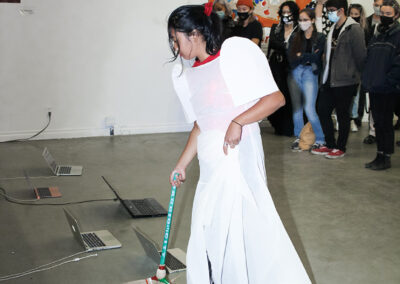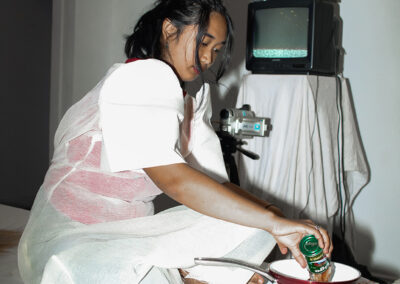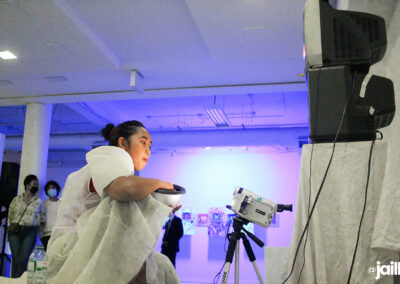1001 Pl. Jean-Paul-Riopelle, Montréal, QC H2Z 1H5
Biography
Joliz Dela Peña, also known as JDP 2009 online, is an interdisciplinary artist from the Philippines, currently based in Tiotià:ke/Montreal. Dela Peña is a self-taught artist whose mediums vary from painting, performance art, and alternative photography. Predominantly exploring the discomfort of social constructs among racialized people, she uses her art and body as a bridge to tackle diverse subjects ranging from social injustices and stereotypes, sexuality/eroticism, and celebration of her cultural roots. In her recent work, she attempts to translate fragmented memoirs, both from her personal life and borrowed, as a first-generation immigrant into a bigger universal perception that the audience may relate to. Her work has been exhibited at WIP gallery, Somewhere Gallery and Rad Hourani Foundation in Montreal.
Approach and works on display
Expressing through something tangible and lucid, Dela Peña’s work evokes the notion of elaborating subtle discomforts rooted from realizations of ugliness of social, political or personal construct. She transforms subject matters that are often bypassed by sociocultural forces into movements and still objects to underline the realities of people’s lives at the bottom of the system. She endeavours to relive such realities, explore its complexity and translate the invisible tension and uncomfortable elements through her performance, photography and painting. In her performance, the concept often shapes itself, and the more she provokes to extract the key element, the more the idea gets refined. The audience and surroundings play a big role in such a process. She embraces the spontaneous and unpredicted actions and consequent reactions that take part in her performances.
Kain Na (2020)
Kain Na (“Let’s Eat” in English) is a tribute to Dela Peña’s mother and to all resilient immigrants. The performance responds to her personal interpretation of the word “immigration” as family reunification. She was only 7 years old when her mother decided to fly to Canada to pursue a better opportunity, and Dela Peña never stopped dreaming of the day they live together again. Communication only through screens for a decade heavily inspired this performance piece. The main focus of Kain Na is the action of eating in front of a computer webcam. She aims to demonstrate not only sharing the tradition of coming together to eat a meal, but also what it feels like to carry such tradition when family members live apart. This performance is conceived to acknowledge that marginalized immigrants are more than just a status label, and that their stories are just as relevant.






